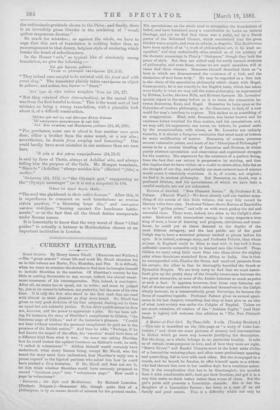• Descartes ; his Life and Meditations. By Richard Lowndos.
(Frederic Norgate.)—Descartes' life, though quite that of a philosopher, is by no means devoid of interest for the general reader.
His speculations on the whole tend to strengthen the foundations of belief, and have furnished many a contribution to books on natural theology, and yet we fled that there was a party, led by a Dutch pastor of the Reformed Church, which maintained that the groat thinker was a sceptic, and even an atheist, in disguise. The Meditations have been spoken of as "a work of philosophical art, in its kind un- equalled," and they undoubtedly 'often remind us of the subtlety of the Socratic reasouings in Plato's "Dialogues," though they lack the grace of style. But they are suited only for really earnest students of philosophy, and even these, unless we are much mistaken, will at times find them obscure. Descartes himself described them as "a book in which are demonstrated the existence of a God, and the distinction of soul from body." Ho may be regarded as a first link in the chain of the speculative philosophy which closes with Hegel. Consequently, he is not exactly to the English taste, which has taken more kindly to what we may call the sense-philosophy, as represented by Hobbes, Locke, the two Mills, and Herbert Spencer. Mr. Lowndos' special object in the essay before us is to trace the connection be- tween Descartes, Kant, and Hegel. Descartes he looks upon as the Columbus of modern philosophy, as the discoverer, in fact, of a new world for man's intellect to explore. This strikes us as something of an exaggeration. Mind, with Descartes, was better known and its existence bettor vouched for than matter, and his speculations, and we may add, his arguments, can never, wo believe, be pushed aside by the sensationalists, with whom, as Mr. Lowndos not unfairly remarks, it is altriest a foregone conclusion that mind must at bottom be some modification of matter. Descartes, of course, presents several vulnerable points, and much of his " Principles of Philosophy " seems to be a curious blending of Lucretius and Newton, in which purely abstract speculation and observation and experiment straggle for the mastery. His argument for the existence of a perfect Being, from the fact that our nature is progressive by striving, and that this implies that we have within us a model to strive after, falls flat on the thought of our day, and probably our most eminent mon of science would count it absolutely worthless. It is, of course, not original ; we find it in ancient philosophy. But Descartes, no doubt, was a profound thinker, and his speculations, of which we have here a careful analysis, are not yet exhausted.


































 Previous page
Previous page